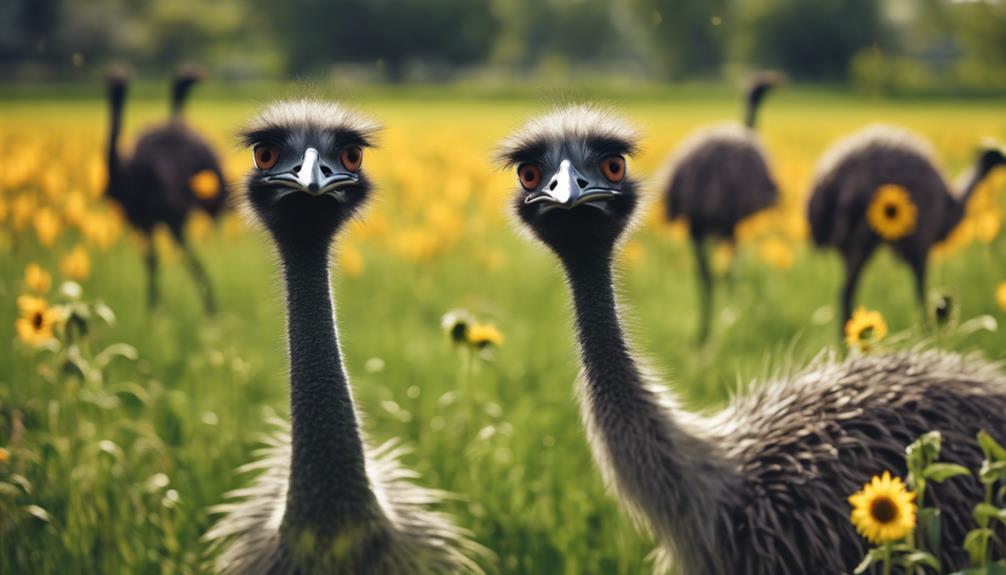
Imagine a vast expanse where emus roam freely, their vibrant plumage catching the sunlight. Ensuring these majestic birds thrive involves understanding the essential vitamins they need. From Vitamin A for vision to Vitamin C for immune support, each plays a vital role in their well-being. But what about the lesser-known vitamins that are equally crucial for their health and vitality? Let's uncover the secrets behind these essential nutrients and how they contribute to the overall wellness of emus.
Key Takeaways
- Vitamin A maintains emu health, essential for vision, growth, and immunity.
- Vitamin D crucial for bone health, calcium absorption, and immune function.
- Vitamin E vital for immune system, reproductive health, and growth.
- Vitamin K essential for blood clotting, bone health, and cardiovascular support.
- Vitamin C enhances immune system, collagen production, acts as an antioxidant.
Vitamin A

To maintain optimal health in your emus, ensure they receive adequate amounts of Vitamin A through their diet. Vitamin A plays a crucial role in the overall well-being of your emus by supporting various physiological functions. This essential vitamin is involved in maintaining healthy vision, promoting proper growth and development, and supporting the immune system's functionality.
Emus can obtain Vitamin A from sources such as green leafy vegetables, carrots, and liver. Ensuring a diet rich in these Vitamin A sources will help prevent deficiencies that can lead to health issues in your emus. Vitamin A deficiency can manifest as vision problems, decreased immunity, and stunted growth, negatively impacting the overall health and performance of your emus.
Vitamin D
For healthy emus, ensuring adequate intake of Vitamin D is crucial as it plays a vital role in various physiological processes. Vitamin D, often referred to as the "sunshine vitamin," is essential for calcium absorption, bone health, and immune function in emus. Deficiency in Vitamin D can lead to weakened bones, decreased egg production, and compromised overall health.
To ensure your emus receive adequate Vitamin D, you can provide them with a balanced diet that includes sources of this essential vitamin. Additionally, exposure to natural sunlight is key as emus can synthesize Vitamin D through their skin when exposed to sunlight.
| Sources of Vitamin D for Emus | Recommended Intake |
|---|---|
| Sunlight exposure | 2-4 hours daily |
| Fortified feed | As recommended by a veterinarian |
| Fish liver oils | Occasional supplementation |
Vitamin E

Ensuring adequate intake of Vitamin E is essential for maintaining the health and well-being of emus. Vitamin E, a group of fat-soluble compounds with antioxidant properties, plays a crucial role in protecting cells from damage caused by free radicals. For emus, Vitamin E is particularly important in supporting their immune system, reproductive health, and overall growth and development.
Emus primarily obtain Vitamin E through their diet, with sources like green leafy vegetables, nuts, and seeds being rich in this vital nutrient. Deficiencies in Vitamin E can lead to weakened immune function, muscle degeneration, and impaired reproductive capabilities in emus. To prevent such issues, emus should have access to a balanced diet that includes sufficient Vitamin E content.
Supplementing emus' diet with Vitamin E may be necessary in cases where natural sources are limited. Consulting with a veterinarian or avian nutritionist can help determine the appropriate dosage and form of Vitamin E supplementation for emus, ensuring their optimal health and vitality.
Vitamin K
Adequate intake of Vitamin K is crucial for the optimal health and well-being of emus. This essential fat-soluble vitamin plays a significant role in blood clotting, bone metabolism, and cardiovascular health in emus. Here are four key points to highlight the importance of Vitamin K for emus:
- Blood Clotting: Vitamin K is essential for the synthesis of clotting factors in the blood, ensuring that emus can effectively stop bleeding when injured.
- Bone Health: Vitamin K is involved in the regulation of calcium in bones, promoting bone mineralization and strength in emus, which is vital for their overall skeletal health.
- Anti-Inflammatory Effects: Vitamin K acts as a powerful anti-inflammatory agent, helping emus combat inflammation and maintain a healthy immune system.
- Cardiovascular Support: Vitamin K aids in preventing calcification of arteries and supports heart health by ensuring proper blood flow and circulation in emus.
Incorporating Vitamin K-rich foods or supplements into an emu's diet is essential to support these critical physiological functions and maintain their overall health and well-being.
Vitamin B1

Vitamin B1, also known as thiamine, is an essential nutrient for emus to support their metabolic processes and overall health. Thiamine plays a crucial role in converting carbohydrates into energy, ensuring that your emus have the necessary fuel for their daily activities. This vitamin is also involved in maintaining a healthy nervous system, aiding in the proper functioning of nerves and muscles.
Deficiency in Vitamin B1 can lead to severe health issues in emus, such as weakness, loss of appetite, and neurological problems. To prevent such complications, it's vital to provide your emus with a balanced diet that includes sources of Vitamin B1. Foods rich in thiamine include whole grains, legumes, and certain vegetables.
Ensuring that your emus receive an adequate amount of Vitamin B1 is crucial for their well-being and performance. By incorporating thiamine-rich foods into their diet, you can support their metabolic functions and promote overall health. Remember, a healthy emu is a powerful emu.
Vitamin B2
When considering the nutritional needs of your emus, it becomes evident that Vitamin B2, also known as riboflavin, is essential for supporting various physiological functions. Here are four crucial reasons why Vitamin B2 is indispensable for the health of your emus:
- Energy Production: Vitamin B2 plays a key role in the conversion of carbohydrates into adenosine triphosphate (ATP), the main energy currency of the cell.
- Antioxidant Defense: Riboflavin is a precursor to the coenzymes flavin mononucleotide (FMN) and flavin adenine dinucleotide (FAD), which are involved in antioxidant defense mechanisms within the cell.
- Growth and Development: Adequate levels of Vitamin B2 are necessary for the growth, development, and maintenance of healthy feathers, skin, and overall body structure in emus.
- Reproductive Health: Riboflavin is crucial for maintaining reproductive health in emus, playing a role in fertility and egg production.
Ensuring your emus receive sufficient Vitamin B2 in their diet is vital for their overall well-being and optimal performance.
Vitamin B3

To support the optimal health and performance of your emus, it's crucial to understand the significance of Vitamin B3, also known as niacin, in their dietary requirements. Vitamin B3 plays a fundamental role in the metabolism of fats, proteins, and carbohydrates, providing essential energy for your emus' daily activities and overall growth. Niacin is involved in various enzymatic reactions that are critical for converting nutrients into usable forms of energy within the emus' bodies.
Deficiency in Vitamin B3 can lead to severe health issues in emus, such as decreased growth rates, digestive problems, and even neurological disorders. Ensuring that your emus receive an adequate amount of niacin in their diet is vital for their well-being and productivity.
Sources rich in Vitamin B3 include fortified grains, seeds, nuts, and green leafy vegetables. Incorporating these foods into your emus' diet will help maintain their niacin levels within the optimal range, promoting strong immune function and overall vitality. Remember, a well-balanced diet with sufficient Vitamin B3 is essential for the flourishing health of your emus.
Vitamin B5
A crucial component in the metabolic processes of emus, Vitamin B5, also known as pantothenic acid, is essential for energy production and overall health. Here's why this vitamin is crucial for your emus:
- Energy Production: Vitamin B5 plays a vital role in converting the food your emus eat into energy, ensuring they have the stamina needed for their activities.
- Healthy Coat and Skin: This vitamin supports the health of your emus' feathers and skin, keeping them in optimal condition.
- Supports Hormone Synthesis: Vitamin B5 is involved in the synthesis of hormones in emus, helping to regulate various bodily functions.
- Enhances Immune System: By supporting the production of antibodies, Vitamin B5 helps boost your emus' immune system, keeping them healthy and resilient against diseases.
Ensuring that your emus receive adequate Vitamin B5 in their diet is crucial for their overall well-being and performance. Be sure to include sources of this essential vitamin in their feed to maintain their health and vitality.
Vitamin B6

Vitamin B6, also known as pyridoxine, plays a crucial role in the metabolic processes of emus, contributing to various physiological functions essential for their overall health and well-being. This vitamin is pivotal in the synthesis of neurotransmitters, such as serotonin and dopamine, which are vital for proper nerve function and behavior regulation in emus. Additionally, Vitamin B6 is involved in the metabolism of proteins, carbohydrates, and fats, ensuring that emus can efficiently utilize these nutrients for energy production and growth.
Furthermore, Vitamin B6 supports the immune system of emus by aiding in the production of antibodies that help combat infections and diseases. It also plays a significant role in the formation of hemoglobin, the protein responsible for transporting oxygen in the blood, thereby ensuring adequate oxygen delivery to tissues and organs. Ensuring that emus receive sufficient Vitamin B6 in their diet is crucial for maintaining their overall health and maximizing their performance and productivity.
Vitamin B9
Emus require a sufficient intake of Vitamin B9, also known as folate, to support crucial physiological processes and ensure optimal health and performance. Here are four key reasons why Vitamin B9 is essential for the well-being of your emus:
- Cellular Growth and Division: Vitamin B9 plays a vital role in DNA synthesis and repair, which is essential for the growth and division of cells, including those involved in muscle development and tissue repair in emus.
- Red Blood Cell Formation: Adequate levels of Vitamin B9 are necessary for the production of red blood cells. Emus need these cells to transport oxygen throughout their bodies, supporting their overall energy levels and vitality.
- Neurological Function: Folate is crucial for proper brain function and nerve signaling. It helps in the synthesis of neurotransmitters, which are essential for various physiological processes, including muscle coordination and overall cognitive function in emus.
- Immune System Support: Vitamin B9 plays a role in supporting the immune system, helping your emus stay healthy and resilient against infections and diseases. Adequate folate levels are essential for maintaining a robust immune response in emus.
Vitamin B12

Crucial for various physiological functions, Vitamin B12 is vital for the optimal health and performance of emus. This water-soluble vitamin, also known as cobalamin, plays a key role in the synthesis of DNA, red blood cell formation, and neurological function. Emus, like many other animals, are unable to produce Vitamin B12 endogenously, necessitating dietary intake to meet their physiological requirements.
Vitamin B12 functions as a cofactor for enzymes involved in essential metabolic pathways. It aids in converting homocysteine to methionine, a process critical for protein synthesis and overall growth. Additionally, Vitamin B12 is crucial for maintaining the myelin sheath that surrounds and protects nerve fibers, supporting proper nerve signaling and coordination in emus.
Deficiency in Vitamin B12 can lead to severe health issues in emus, including anemia, poor growth, and neurological abnormalities. To ensure your emus thrive, incorporate Vitamin B12 sources like fortified feed, supplements, or injections into their diet regimen. Prioritize this essential vitamin to safeguard the well-being and performance of your emus.
Vitamin C
Rich in antioxidants and essential for collagen synthesis, Vitamin C is a vital nutrient for the health and well-being of emus. Here are four essential roles of Vitamin C in emus' health:
- Immune System Support: Vitamin C plays a crucial role in enhancing the immune system of emus, helping them fight off infections and diseases effectively.
- Collagen Production: As a key element in collagen synthesis, Vitamin C promotes healthy skin, feathers, and overall tissue repair in emus, ensuring their structural integrity.
- Antioxidant Protection: Vitamin C acts as a powerful antioxidant, protecting emus from oxidative stress and reducing the risk of cellular damage.
- Iron Absorption: By enhancing the absorption of iron, Vitamin C aids in preventing anemia in emus, ensuring optimal oxygen transport throughout their bodies.
Incorporating Vitamin C-rich foods or supplements into emus' diets is essential to support their overall health and vitality.
Frequently Asked Questions
Can Emus Overdose on Vitamin Supplements?
You should be cautious with vitamin supplements for emus. Overdosing can lead to adverse effects on their health. It is crucial to follow recommended dosages and consult a veterinarian for proper guidance to prevent any harm.
Are There Any Side Effects of Vitamin Deficiencies in Emus?
Without essential vitamins, emus can suffer from various health issues. Deficiencies may lead to poor feather quality, decreased immune function, and impaired reproduction. Ensure a balanced diet to prevent these side effects in your emus.
How Often Should Emus Be Given Vitamin Supplements?
To ensure optimal health for your emus, provide vitamin supplements according to a schedule recommended by a veterinarian. Consistent administration is crucial. Emus may require different dosages based on individual needs and environmental factors.
Can Emus Get Enough Vitamins From Their Diet Alone?
You can provide emus with a variety of foods to meet their vitamin needs, but supplementation may be necessary. Consult a vet to assess specific requirements. Remember, a balanced diet plays a vital role in their overall health.
Are There Specific Age-Related Vitamin Requirements for Emus?
As emus age, their vitamin requirements may vary due to shifts in metabolic processes and physiological changes. It is crucial to monitor and adjust their diet to ensure they receive adequate levels of essential vitamins for optimal health.
Conclusion
In conclusion, ensuring emus receive adequate amounts of essential vitamins is crucial for their overall health and well-being.
Vitamins such as Vitamin A, D, E, K, B complex, and C work together to support various bodily functions. They contribute to vision, immune system health, bone strength, and cardiovascular support.
By providing a balanced diet rich in these vital nutrients, emus can thrive and flourish like a finely tuned engine.





